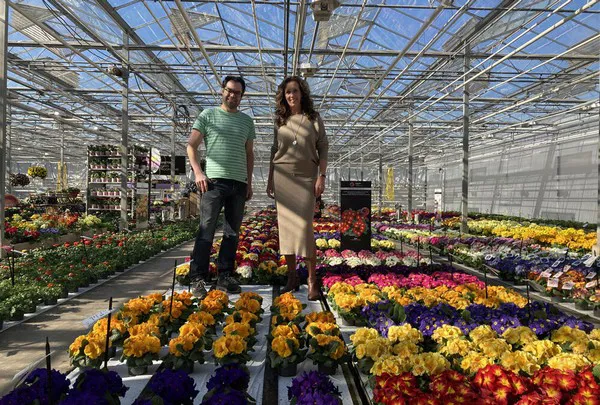Wageningen University & Research's Greenhouse Horticulture & Flower Bulbs Business Unit will be researching what circular greenhouse horticulture means for horticultural businesses over the next few years. The research is financed by the Club van 100, some of whose members, such as breeding company Florensis, are also members of the research's supervisory committee. Greenport West-Holland spoke about this with cultivation specialist/researcher Alex Leinenga and sustainability and communication manager Regina Dinkla.

How does Florensis work on circularity?
Alex: "Our aim for 2025 is to reduce our CO2 footprint. That's why we take a critical look at things like energy consumption, residual flows, waste and crop protection products. We are doing this together with our foreign branches."
Regina: "Last year we organized a sustainability prize for employees. Many good ideas came out of it. The winning idea concerned the plant material we use in shows: can't we compost it and mix it with the potting compost we buy? We are now working on that idea and other suggestions."
Does money play a role in this?
Alex: "The great thing is that sustainable measures can sometimes save money. One example is crop protection. After using chemical agents, employees are not allowed in the greenhouse for a while; you don't have that problem with most organic substances."
Regina: "In our branches in Kenya and Ethiopia, plastic bags were used for mother plant cultivation. They were thrown away afterward. Now we use plastic plant containers that can be used several times. Our well-known blue plastic Florensis trays have also been sent to Kenya for the cultivation of cutting material. These can be washed and reused after production."
What is the driving force behind this ambition?
Regina: "A few years ago, the management of Florensis put sustainability high on the agenda. Reducing the CO2 footprint is our ambition for 2025. The footprint of the transport from Kenya is compensated by local tree planting: 6,000 trees are planted each year by an external party in the vicinity of our location in Kenya. But circularity goes further than just the CO2 footprint. For instance, we are affiliated to the Floriculture Sustainability Initiative (FSI): on behalf of Florensis, I am a member of the working group on Living Wages. Together with the retail sector, among others, we are looking for ways to reduce and eventually hopefully solve the differences."
How important is cooperation with chain partners?
Alex: "You can't do it alone, you need each other. But sometimes this creates a dilemma. For example, retailers want fewer pesticides to be used. But they also don't want products containing insects. This means that you cannot use natural enemies. The use of green products is then a good alternative, but you have to change other things, such as humidity and temperature during cultivation."
How were you involved in the Circular Glasshouse Horticulture project?
Alex: "The project leader at the time asked us to join. He was looking for a company that was at the heart of things to spar with. And it gives us the opportunity to change gear quickly and to test solutions in practice. For example, we are investigating whether peat-free cultivation of plants works. We can then show that to our customers.
About the Circular Glasshouse Horticulture project
In the Circular Glasshouse Horticulture project, the Glasshouse Horticulture & Flower Bulbs Business Unit of Wageningen University & Research is investigating the consequences of the circular economy for glasshouse horticulture companies. The research is funded by the Club van 100. Greenport West-Holland is co-responsible for the external communication.
